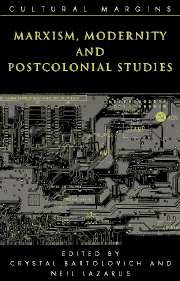Book contents
- Frontmatter
- Contents
- 1 Introduction: Marxism, modernity and postcolonial studies
- Part I Eurocentrism, “the West,” and the world
- Part II Locating modernity
- 6 Misplaced ideas? Locating and dislocating Ireland in colonial and postcolonial studies
- 7 Liberation theory: variations on themes of Marxism and modernity
- 8 Sex, space and modernity in the work of Rashid Jahan, “Angareywali”
- 9 Was there a time before race? Capitalist modernity and the origins of racism
- Part III Marxism, postcolonial studies, and “theory”
- References
- Index
6 - Misplaced ideas? Locating and dislocating Ireland in colonial and postcolonial studies
Published online by Cambridge University Press: 22 September 2009
- Frontmatter
- Contents
- 1 Introduction: Marxism, modernity and postcolonial studies
- Part I Eurocentrism, “the West,” and the world
- Part II Locating modernity
- 6 Misplaced ideas? Locating and dislocating Ireland in colonial and postcolonial studies
- 7 Liberation theory: variations on themes of Marxism and modernity
- 8 Sex, space and modernity in the work of Rashid Jahan, “Angareywali”
- 9 Was there a time before race? Capitalist modernity and the origins of racism
- Part III Marxism, postcolonial studies, and “theory”
- References
- Index
Summary
The emergence of colonial and postcolonial studies within the Irish academy as a distinct mode of critical analysis can be dated to the start of the 1980s. In retrospect, the Field Day Theatre Company's staging of Brian Friel's Translations in 1980 seems a formative moment: the play dealt with the state-sponsored mapping and the Anglicization of the nineteenth-century Irish landscape, provoking questions about the relationship between knowledge, language, and power that would soon be taken up in Irish postcolonial studies also. Later in the decade, the small but growing body of work that shared this colonialistinterest received considerable stimulus when Field Day commissioned pamphlets by Edward Said (1990), Fredric Jameson (1990b) and Terry Eagleton (1990) which examined modern Irish culture within the context of colonialism, imperialism, and anticolonial nationalism. At the same time, David Cairns and Shaun Richards published their seminal Writing Ireland: Colonialism, Nationalism, and Culture (1988) – the first extended historical survey of Irish literature to draw explicitly on the wider international body of postcolonial criticism inspired by Said's Orientalism. The topic's increasing significance in Irish cultural studies was indicated at the start of the 1990s when essays by Luke Gibbons (1991), David Lloyd (1991) and Clair Wills (1991) appeared in a special issue of The Oxford Literary Review devoted to the subject of colonialism. Since then a substantial body of criticism by some of Ireland's most distinguished cultural critics has appeared, drawing extensively on the theoretical resources of postcolonial studies (e.g., Boylan and Foley 1992; Lloyd 1993, 1999; Kiberd 1995; Deane 1997; Bourke 1999).
- Type
- Chapter
- Information
- Marxism, Modernity and Postcolonial Studies , pp. 101 - 124Publisher: Cambridge University PressPrint publication year: 2002
- 10
- Cited by

